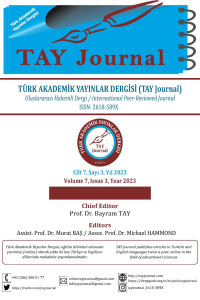Research Article
Systematic Reviews and Meta Analysis
Systematic Reviews and Meta Analysis
1. An Investigation of Research on Differentiated Instruction Approach in Preschool Education Between 2005-2022Aim & Scope
TAY Journal is an international peer-reviewed and published the first issue in 2017. TAY Journal, which aimed at disseminating developments in national and international arenas regarding education, aims at contributing to the development of the education system in this way. TAY Journal, aims at serving to publish academic researches which entreating all issues the all levels (early childhood education, elementary education, secondary and higher education, adult education) of education and proposing tangible solutions.
Within the scope of these aims, TAY Journal, accepts manuscripts quantitative and qualitative education researches in all areas of education; from early childhood education to adult education, music education to mathematics education, physical education to science education, visual art education to social studies education, educational administration to psychic education, special education to gifted education.
The following fields of studies are within the publication scope of TAY Journal.
Social Studies Education
Classroom Teacher Education
Computer Education and Instructional Technologies
Measurement and Evaluation in Education
Educational Curriculum and Instruction
Educational Administration and Supervision
Science Education
Mathematics Education
Music Education
Early Childhood Education
Psychological Counseling and Guidance
History Education
Turkish Language Learning
Geographical Education
Physical Education
Author Guidelines
TAY Journal is an international, a double-blind peer review journal which accepts research and review articles in Turkish and English.
Content of manuscript, scientificness, and other issues are the author(s) responsibility. Author(s) are deemed to have accepted all terms and conditions stated of Journal after submission.
1. Manuscripts which are submitted to TAY Journal, are taken for preliminary consideration in terms of the manuscript template. If Inappropriate manuscripts are returned to the author(s).
2. The manuscripts submitted to TAY Journal are reviewed by the editors secondarily. At this stage, the manuscripts which are not related to the journal's aim, scope, publishing policy and principles, wording, originality, scientific issues. Manuscripts which have lack of mentioned the publishing criteria are rejected. Manuscripts deemed acceptable, are directed to a field editor related to the subject of study that the work focuses on.
3. The field editor pre-evaluates the originality, the convenience of field, statistics. Also, the studies which are deemed appropriate are assigned to reviewers anonymously. Reviewers are assigned as the author(s) affiliated out, from TAY’s reviewer pool or members of the editorial board. At the end of reviewers’ reports, the manuscript has two rejections or one rejection, and major revision, author(s) is/are informed about not publishing the manuscript with the reasons. Apart from that, field editor examines reviewers’ reports, he/she may initiate the procedure extension in necessary cases.
5. The final decision, which is about the manuscript completed review process, successfully belongs to the Editorial Board.
6. Accepted manuscripts’ procedures as follows:
• Accepted manuscripts’ reviewers’ report and Editorial Board’s reports are sent to the corresponding author.
• Corresponding author revises the manuscript in reference to reports and conveys it to Editor.
• Editor check all correction and revisions, he/she initiates revision process, if he/she has revision notes, he/she sends them to corresponding authors.
• The manuscript was audited for plagiarism.
• Revision process completed manuscripts are sent to typesetting.
• Manuscripts which are completed typesetting, are sent to the corresponding author for the last check and corrections.
• Manuscripts which are completed revision process are published in “ Future Issue.”
• Manuscripts which are published in “Future issue Gelecek,” are put into the process of publication and are published in the corresponding issue.
7. Communication between authors and reviewers are exected by Editorial Board.
8. Copyright of manuscripts have author(s) approve Copyright Form While submission of the manuscript.
9. Editorial team board are asked for their opinion regarding determining journal publishing policy, updating and in need of assigning reviewers.
10. The submitted manuscript has not been previously published and has not been submitted to any publication.
11. Authors must prepare their manuscript according to APA6 (American Psychological Association) standards.
12. It is mandatory to do proofreading manuscripts and certify it before publication.
13. The manuscript should be sent with originality report retrieved from plagiarism program ( e.g., Ithenticate).
14. Each author’s 16 digits ORCID ID should be included in the manuscript.
Ethical Principles and Publication Policy
Ethical Principles
Ethical Responsibilities of Author or Authors of TAY Journal
It is mandatory to follow the standards of required ethical behavior for all parties including the publisher, the journal editor, the peer reviewer and the author taking part in the process publishing. TAY JOURNAL’s Publication Ethics and Publication Malpractice Statements is totally structured on COPE’s Best Practice Guidelines for Journal Editors. Our journal firmly pursues the Code of Conduct for Journal Publishers. TAY JOURNAL is committed to acting in accordance with the utmost practices on ethical issues. Further, it is dedicated to complying with and maintaining the standards of ethical acts at every phase of the publication process. In case the editors, authors, reviewers, and stakeholders require any explanation about the bellow mentioned statements, they should have a look at the original COPE guidelines.
Submitted manuscript must be the original work of the author(s).
Only unpublished manuscripts should be submitted.
It is unethical to submit a manuscript to more than one journal concurrently. The author(s) should not send an article published in or sent to be published in another journal.
Any conflict of interest must be clearly stated.
Acknowledge the sources of data used in the development of the manuscript.
All errors discovered in the manuscript after submission must be swiftly communicated to the Editor.
Author (s) should refer to the sources she/he use in writing articles in the correct way in the direction of ethical principles.
Persons who do not contribute to the articles should not be listed as authors, and it should not be proposed to change the author order of a published article and to add authors.
In the evaluation process of the articles the author(s) should provide the editorial staff with information about the articles or the raw data if required.
The authors must document the rights to use the data they use in their articles, the permission for research or the approval of the participants to whom they have searched.
The author(s) must specify that they received the ethics committee approval for the researches that require data collection by using quantitative or qualitative methods such as experiment, survey, scale, interview, observation, focus group work that require ethics committee decision; the author(s) must also specify the name of the ethics committee, the date and the number of the ethics committee decision on the first-last page and in the method section of the candidate article. In addition, the author(s) must include information on the fact that the informed consent form was received for the case reports in the articles.
The author(s) should present proof of their ethical principles for data collection process (such as obtaining permission from others to use their documents such as scale, questionnaire, photograph etc.) in the article. It should be noted in the articles that the copyright regulations for research and publication ethics and intellectual and artistic works are complied with. If the study is conducted on human and animal subjects, it should be reported in the article that the study was carried out in accordance with international reports, guidelines, etc.
Ethics committee approval is not required for review articles from the author(s). However, it should be stated in articles not requiring an ethics committee decision that the ethics committee decision is not required on the first-last page and in the method section of the article.
Ethical Responsibilities of Reviewer or Reviewers of TAY Journal
Reviewers evaluate articles based on the intellectual content of the article, regardless of gender, race, ethnicity, religion, citizenship, political belonging, values, and the paradigm orientation of the author(s).
Reviewers should report to the Editor of any conflict of interest observed during the review process.
Reviewers should make the evaluation impartially and confidentially.
Reviewers should evaluate the articles they agree on during the evaluation.
That any information that may be the reason for the rejection of publication of a manuscript must be communicated to the Editor.
Reviewers should only accept to evaluate the articles related to the field of their specializations.
Ethical Responsibilities of Editors, Co-Editors and Field Editors of TAY Journal
Editors try to inform reviewers, authors, researchers and readers, to answer their questions clearly within the principles of clarity.
While editors are making decisions about the article publication, they consider originality, contribution to the field, clarity of expressions, content and validity and reliability of the articles.
Editors implement the policies of blind review and evaluation processes, keep private personal identity information of the authors, and provide impartial evaluation processes in due of time for the articles.
Editors send the articles to field editors and reviewers considering their professional fields, and care that the articles are evaluated impartially and independently.
Editors, in evaluation processes, consider if there are conflicts or collaborations between authors and reviewers or not.
Editors prevent non-scientific that do not comply with academic etiquette rules.
Editors provide protection of personal data in assessed articles; they keep personal data of authors, referees and readers.
Editors attach importance to the protection of human and animal rights in the articles, emphasize that the clear approval of the participants of the article is documented, and rejects the articles witout the approval of the ethics committee on the participants of the article and without any permit in experimental investigations.
Editors provide errors, inconsistencies, or misleading errors in articles to be corrected.
The Editorial Board takes responsibility for making publication decisions for submitted manuscripts based on the reviewer’s evaluation of the manuscript, policies of the journal editorial board and legal restrain acting against plagiarism, libel and copyright infringement.
That all manuscripts are evaluated in fairness based on the intellectual content of the paper regardless of gender, race, ethnicity, religion, citizenry, political affiliation and values nor paradigmatic orientation of author(s).
Notification of Ethics Non-Principles Status Editor
In case of encountering an unethical situation in articles or about editors, reviewers and authors or in articles that does not comply with the ethical principles regarding in the TAY Journal, it should be reported by editortayjournal@gmail.com
Publication Policies
TAY Journal is an international scientific academic open access journal for the publication of research and studies covering all aspects of education and education-related issues.
TAY Journal publishes articles in Turkish and English languages.
The TAY Journal is published three times a year.
The review process at TAY Journal is carried out on the principle of double blind review. In this principle the identities of the authors and reviewers are confidential.
TAY Journal, an internationally peer-reviewed journal, is a non-profit journal.
Open Access Policy
It is free to access to Tay Journal. The policy of Budapest Open Access Initiative has been applied in our journal. The details regarding The Budapest Open Access Initiative can be found on the link https://www.budapestopenaccessinitiative.org/read
CC BY license type is used in our journal. https://creativecommons.org/licenses/by/4.0/deed.tr
TAY Journal is an Open Access journal and provides immediate open access to its contents. The journal aims to contribute to the promotion, development and dissemination of published science and information through the Open Access policy.
Plagiarism Policy
TAY Journal passes every work that has completed the referee process to the control of plagiarism in order to protect its integrity. Plagiarism checks are carried out via Turnitin and iThenticate software.
The editorial board may request correction of mistakes from the corresponding author in the direction of the report that emerges after the plagiarism audit, or may decide that the work should not be published.
Price Policy
TAY Journal is an international refereed academic journal published online in the field of educational sciences. Author(s) submitting an article to TAY Journal are required to pay a fee, regardless of the acceptance/rejection condition. Fees received are used for the expenditure items listed below. At the end of the article evaluation (referee evaluation) process, the author(s) of the articles that are not deemed appropriate to be published (rejected) by the editorial board are not refunded. Author(s) whose article is not accepted for publication can send a second article to our journal without paying an additional service fee.
General Expenses/Expenditures Affecting the Article Publishing Cost of Our Journal
• Domain name fees
• Hosting (journal hosting fee - TAY Journal is also published on an independent site at www.tayjournal.com)
• Site design, update, development and technical support fee
• Secretarial and layout service fee
• DOI fee (Annual subscription fee and a separate fee for each article - TAY Journal does not receive the doi service from DergiPark)
• Registration fee to international directories (index)
• Various rent and billing fees etc.
Indexes
Other Indexes
Journal Boards
Chief Editor

Editors

Doktora/Sanatta Yeterlilik/Tıpta Uzmanlık, Türkiye, Gazi Üniversitesi, Eğitim Bilimleri Enstitüsü, Sınıf Eğitimi (Dr), 2015, 2021
Yüksek Lisans, İngiltere, The University Of Warwick, , 2011, 2013
Lisans, Türkiye, Erciyes Üniversitesi, Eğitim Fakültesi, Temel Eğitim Bölümü, 2005, 2009
Lisans, Türkiye, Anadolu Üniversitesi, Açıköğretim Fakültesi, Yönetim Bilişim Sistemleri Bölümü, 2020- Devam Ediyor
Lisans, Türkiye, Gaziosmanpaşa Üniversitesi, Fen-Edebiyat Fakültesi, Fizik Bölümü, 2003-2005
Editorial Board


Muhittin Çalışkan, PhD, is a Professor for Ankara Music and Fine Arts University, Faculty of Music and Fine Arts Education, Department of Educational Sciences. His research interests and expertise include academic achievement, instructional and learning strategies, executive cognition, affective factors in learning and recently philosophy with children.



 Web
Web
For contact

Doktora/Sanatta Yeterlilik/Tıpta Uzmanlık, Türkiye, Gazi Üniversitesi, Eğitim Bilimleri Enstitüsü, Sınıf Eğitimi (Dr), 2015, 2021
Yüksek Lisans, İngiltere, The University Of Warwick, , 2011, 2013
Lisans, Türkiye, Erciyes Üniversitesi, Eğitim Fakültesi, Temel Eğitim Bölümü, 2005, 2009
Lisans, Türkiye, Anadolu Üniversitesi, Açıköğretim Fakültesi, Yönetim Bilişim Sistemleri Bölümü, 2020- Devam Ediyor
Lisans, Türkiye, Gaziosmanpaşa Üniversitesi, Fen-Edebiyat Fakültesi, Fizik Bölümü, 2003-2005
Cover design and illustration


Chief Editor

Editors

Doktora/Sanatta Yeterlilik/Tıpta Uzmanlık, Türkiye, Gazi Üniversitesi, Eğitim Bilimleri Enstitüsü, Sınıf Eğitimi (Dr), 2015, 2021
Yüksek Lisans, İngiltere, The University Of Warwick, , 2011, 2013
Lisans, Türkiye, Erciyes Üniversitesi, Eğitim Fakültesi, Temel Eğitim Bölümü, 2005, 2009
Lisans, Türkiye, Anadolu Üniversitesi, Açıköğretim Fakültesi, Yönetim Bilişim Sistemleri Bölümü, 2020- Devam Ediyor
Lisans, Türkiye, Gaziosmanpaşa Üniversitesi, Fen-Edebiyat Fakültesi, Fizik Bölümü, 2003-2005
Editorial Board



 Web
Web

Statistics Editor

Graphic-Design



Contacts and Copy Editing Editors

















![Index of Academic Documents [IAD]](https://dergipark.org.tr/media/cache/journal_index_logo/aa42/0c77/16f5/6488c5eb36e0c.png)


